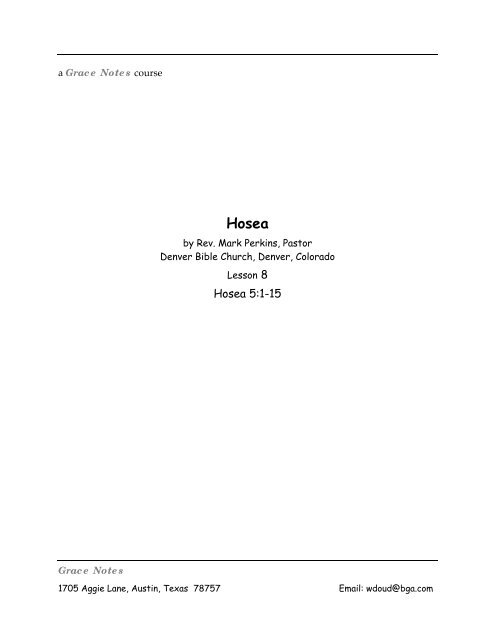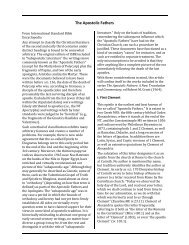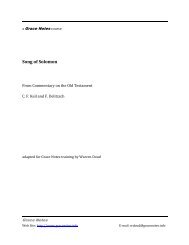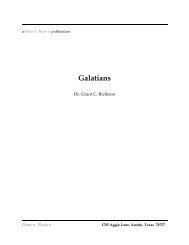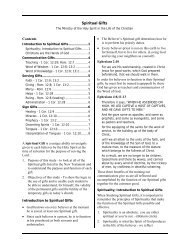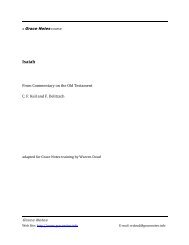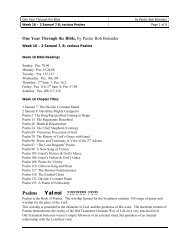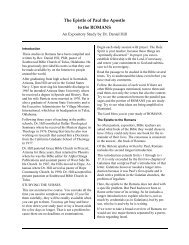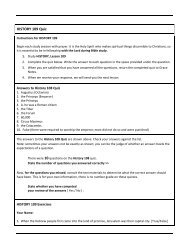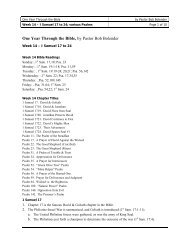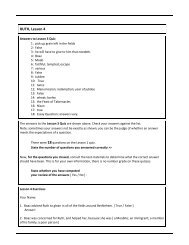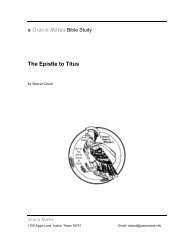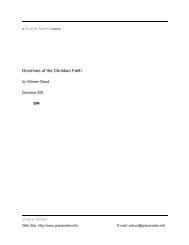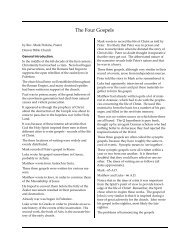Hosea 5:1-15 - Grace Notes
Hosea 5:1-15 - Grace Notes
Hosea 5:1-15 - Grace Notes
Create successful ePaper yourself
Turn your PDF publications into a flip-book with our unique Google optimized e-Paper software.
a <strong>Grace</strong> <strong>Notes</strong> course<br />
<strong>Hosea</strong><br />
by Rev. Mark Perkins, Pastor<br />
Denver Bible Church, Denver, Colorado<br />
Lesson 8<br />
<strong>Hosea</strong> 5:1-<strong>15</strong><br />
<strong>Grace</strong> <strong>Notes</strong><br />
1705 Aggie Lane, Austin, Texas 78757 Email: wdoud@bga.com
<strong>Hosea</strong><br />
Lesson 8: <strong>Hosea</strong> 5:1-<strong>15</strong><br />
Instructions<br />
Lesson 8: <strong>Hosea</strong> 5:1-<strong>15</strong> .......................................................................................................8-4<br />
Lesson 8 Quiz ..................................................................................................................... 8-10
Instructions for Completing the Lessons<br />
Begin each study session with prayer. It is the Holy Spirit who makes spiritual things discernable to<br />
Christians, so it is essential to be in fellowship with the Lord during Bible study.<br />
Read the whole book of <strong>Hosea</strong> often. It is a short book, and reading it many times will help you<br />
understand the story much better.<br />
Instructions<br />
1. Read the introduction to the study of <strong>Hosea</strong><br />
2. Study the <strong>Hosea</strong> passage for this lesson, by reading the verses and studying the notes. Be<br />
sure to read any other Bible passages that are called out in the notes.<br />
3. Review all of the notes in the <strong>Hosea</strong> lesson.<br />
4. Go to the Quiz page and follow the instructions to complete all the questions on the quiz.<br />
The quiz is “open book”. You may refer to all the notes and to the Bible when you take the<br />
test. But you should not get help from another person.<br />
5. When you have completed the Quiz, be sure to SAVE your file. If your quiz file is lost, and<br />
that can happen at <strong>Grace</strong> <strong>Notes</strong> as well, you will want to be able to reproduce your work.<br />
6. To send the Quiz back to <strong>Grace</strong> <strong>Notes</strong>, follow the instructions on the Quiz page.
<strong>Hosea</strong> Lesson 8<br />
<strong>Hosea</strong> Chapter Five<br />
Outline and Overview.<br />
This chapter divides into two parts.<br />
The first half, verses 1-7, concentrates on the<br />
judgement of Israel for their harlotry from God,<br />
paying some attention to specific acts of harlotry<br />
and idolatry.<br />
The second half, verses 8-14, anticipates the final<br />
discipline of Israel, and spends some time on the<br />
specific details of that fifth cycle. It also sends a<br />
warning to Judah, the Southern Kingdom.<br />
Verse fifteen stands separate from the rest of the<br />
chapter, more or less a summary of God's purpose<br />
in the judgment and discipline.<br />
In this chapter, <strong>Hosea</strong> becomes the conduit for<br />
God's message to Israel. Really, it is mostly God,<br />
and very little of <strong>Hosea</strong>'s humanity enters the<br />
picture.<br />
<strong>Hosea</strong> 5:1<br />
Hear this O priests! And give attention O<br />
house of Israel and give ear O house of the<br />
king! For the judgment is for you. Because<br />
you were a trap to Mizpah, and a net spread<br />
out over Tabor.<br />
The Jews had begun to use these two mountains in<br />
Israel for idol worship. Thus they are a trap.<br />
Both of these mountains were famous watch<br />
towers from which they would watch for the<br />
approach of the enemy from the North. Now they<br />
are a trap for the people. They provide temptation.<br />
Formerly a symbol of watchfulness they now<br />
epitomize the opposite.<br />
On these watch-mountains they now welcome the<br />
deadliest of enemies - fallen angels.<br />
A note: Mizpah is right on the mutual border<br />
between Israel and Judah, as are Gilgal and Ai.<br />
The southerners would only have to travel a few<br />
miles to participate in the idolatry at these spots.<br />
That is why the southern kingdom is warned<br />
about these specific places of idol worship.<br />
<strong>Hosea</strong> 5:2<br />
And the revolters have gone deep in<br />
slaughter, but I am a correction to all of<br />
them.<br />
The slaughter here is the Hebrew SHAHATAH,<br />
which denotes the slaughter of animals, for<br />
whatever reason.<br />
It can be for legitimate reasons, such as food or<br />
animal sacrifice.<br />
It can also be as here, the slaughter of animals for<br />
demon worship. The description of Israel wading<br />
deep into slaughter is a really good description of<br />
the depth of degeneracy.<br />
The discipline is MUSAR, always Yahweh putting<br />
divine discipline on someone or some group for<br />
their own good.<br />
Though Israel wades deep into degeneracy,<br />
Yahweh disciplines them on the chance that they<br />
respond.<br />
<strong>Hosea</strong> 5:3<br />
I know Ephraim, and Israel is not hidden<br />
from me. For now you have committed<br />
fornication, O Ephraim. Israel is defiled.<br />
Interesting. Ephraim was the dominant tribe and<br />
largest territory in the Northern Kingdom. God<br />
tells us that the pollution of this tribe extended to<br />
the entire nation. Indeed, the picture is of rape.<br />
Ephraim commits fornication and Israel is defiled.<br />
The niphal stem of the verb NITMA reveals that<br />
Israel does not produce this action, but receives it.<br />
The produced action is the fornication of Ephraim<br />
and the verb that describes it is HIZNEBA, and is<br />
in the hiphil causative stem. The cause is the<br />
fornication of Ephraim; the effect is the defilement<br />
of Israel.<br />
God knows Ephraim and his degeneracy; he sees<br />
what goes on in Israel at the hand of Ephraim and<br />
it is not hidden from His view.<br />
<strong>Hosea</strong> 5:4<br />
Their deeds will not allow them to return to<br />
their God, for a spirit of fornication is in<br />
their midst, and they do not know Yahweh.<br />
8 - 4
<strong>Hosea</strong> Lesson 8<br />
General and specific idolatry make it quite<br />
difficult to have a relationship with God.<br />
A spirit of fornication works in a twofold manner:<br />
First, it reveals an addictive complex of sin related<br />
to fornication.<br />
Second, it reveals a personal relationship with a<br />
fallen angel.<br />
This is a double entendre of general and specific<br />
idolatry.<br />
Idolatry and relationship with God do not ever<br />
mix. They are mutually exclusive.<br />
The idolatry must be relinquished in order to<br />
initiate relationship with God.<br />
Do not confuse this by thinking that anyone's past<br />
can abrogate the possibility of relationship with<br />
God. Such is not true.<br />
What the verse does say is that their present<br />
behavior is incompatible with God, and that they<br />
must leave it behind in order to gain Him.<br />
This does not mean that idolaters are instantly<br />
'cured' of their addictive relationships with<br />
demons.<br />
• Any demon possession immediately ceases at<br />
the moment of belief in Christ.<br />
• Addictive behavior, in some cases, does cease<br />
at the moment of belief in Christ. And in<br />
many cases, the object of addiction just<br />
switched to something else.<br />
• However, many new believers revert back to<br />
the form of their idolatry.<br />
It is abundantly clear from this verse that the idols<br />
must be rejected for one to believe. In fact, the<br />
very expression of belief is a tacit rejection of<br />
idols.<br />
<strong>Hosea</strong> 5:5<br />
And the Majesty of Israel testifies in His<br />
presence [face], and Israel and Ephraim will<br />
be tripped by their iniquity; also Judah will<br />
stumble with them.<br />
The word G'ON describes often the majestic<br />
nature of God. It serves as a synonym for 'the<br />
glory of God'. So this is God here.<br />
God testifies in His own throne room, with the<br />
result that discipline comes against the Northern<br />
Kingdom.<br />
The discipline itself is described by the niphal<br />
verb YIKASHELU. In the active voice it is<br />
stumble, while in the passive, it is more less, 'trip'.<br />
Since this is the passive voice, the Northern<br />
kingdom does not produce the action of the verb,<br />
but instead receives it. They do not stumble, they<br />
are tripped by their own iniquity.<br />
So they fall because of their own iniquity - their<br />
general and specific idolatry.<br />
But an interesting add-on here: Judah will stumble<br />
with them.<br />
• The verb is in the prophetic future perfect<br />
tense. This prediction will most certainly come<br />
true.<br />
• The time remains undefined, so that no one<br />
gives up using fate as an excuse.<br />
• Remember, God uses the destruction of the<br />
Northern Kingdom as an example to the<br />
Southern. "Pay attention! See what I am doing<br />
to you neighbors to the north!<br />
<strong>Hosea</strong> 5:6<br />
And they walk with their flocks and with<br />
their herd to seek Yahweh. But they will not<br />
find Him; He withdrew from them.<br />
Here is a verse that hits home. It is at the time a<br />
very popular thing to 'seek Yahweh'. And so they<br />
go on pilgrimages looking for God.<br />
Looking for an omnipresent God must be an<br />
interesting and time consuming task.<br />
Of course you never have to look for God! What<br />
hypocrisy! First they 'X' God out of their lives<br />
through general and specific idolatry, then they go<br />
looking for him, like they had lost their car keys or<br />
something. This is utter pig-headedness.<br />
In Colorado, of course, we go looking for God in<br />
the mountains. In Israel it was apparently popular<br />
to take a flock of sheep and wander through the<br />
countryside looking for God with your sheep in<br />
tow. This is why they have religious retreats, you<br />
know. To look for God. I have been to many of<br />
8 - 5
<strong>Hosea</strong> Lesson 8<br />
them, and I can say with confidence that God is no<br />
different at a retreat than He is in the inner city.<br />
Do not get caught in the trap that you can only<br />
think things through by getting away from it all.<br />
This is lazy thinking and a fallacy.<br />
The fact of the matter was God had withdrew<br />
from Israel as a part of His discipline. And let me<br />
tell you, when God withdraws from you, forget<br />
about finding Him.<br />
If they would repent, God would return.<br />
<strong>Hosea</strong> 5:7<br />
They dealt treacherously against Yahweh, for<br />
they bore strange children. Now a new moon<br />
will devour them with their portion [land].<br />
The new moon was a time for idol worship -<br />
consider it an astrological kind of thing. At the<br />
new moon the people would get involved in<br />
orgiastic fornication, and as a result, many women<br />
would conceive.<br />
But now those children are monsters - they hate<br />
their parents and their souls are full of bitterness<br />
toward God.<br />
This will come because they have children out of<br />
wedlock, and they continue to commit adultery<br />
against the Lord.<br />
In Israel, the family has been destroyed, from this<br />
has come much degeneracy. The family is a major<br />
restraint on the sin nature.<br />
• For parents, it ties down with responsibility.<br />
• For children, this means training.<br />
The family is an organization which is designed to<br />
prepare children for life in this world.<br />
The parents should be constantly training their<br />
children. They should be trained to respect<br />
authority and to be dependable when given<br />
responsibility.<br />
• They should be trained in manners, so that<br />
they will fit in to any social situation.<br />
• They should be trained to discipline<br />
themselves, mind and body.<br />
• They should be trained to respect and be<br />
sensitive to the opposite sex.<br />
• They should be given the gospel, and the plan<br />
of God.<br />
• They should be trained to be patriotic.<br />
This training, when done properly, strengthens<br />
the child's conscience against the schemes of the<br />
cosmic system, and is a great system of prevention<br />
against self-destruction.<br />
The training should include both punitive<br />
discipline and a fair system of reward.<br />
The training should break the child's arrogance,<br />
but not his spirit.<br />
The loving and sensitive training from the mother<br />
to the male child protects the women of the next<br />
generation from male tyranny.<br />
The loving and sensitive training from the father<br />
to the female child protects the men of the next<br />
generation from female tyranny.<br />
Having children outside of wedlock or raising<br />
children from a divorce makes it very difficult for<br />
them to be normal.<br />
Parents who do not make a commitment to one<br />
another will not make a commitment to their<br />
children.<br />
Parents who give up on each other also give up<br />
easily on their children.<br />
The majority of divorces are the result of selfcentered<br />
arrogance, and that arrogance cannot<br />
properly raise children. Some divorces are<br />
necessary and unselfish; some are done to protect<br />
the children.<br />
Fornication and adultery is just plain self-centered<br />
arrogance, and children who come from such a<br />
liaison suffer from their parents' arrogance.<br />
Therefore, having illegitimate children is a<br />
disaster for any nation. However, an illegitimate<br />
pregnancy is not a legitimate excuse for abortion.<br />
The conclusion: do not get involved in<br />
fornication and adultery.<br />
<strong>Hosea</strong> 5:8<br />
Blow a horn in Gibeah, a trumpet in Ramah.<br />
Sound an alarm at Beth-aven: 'Behind you,<br />
Benjamin.'<br />
8 - 6
<strong>Hosea</strong> Lesson 8<br />
The first part of this verse has to do with<br />
geography. The place names here are all inside the<br />
border between Israel and Judah.<br />
In previous verses the place names have been<br />
across the border inside Israel (Gilgal, Beth-Aven),<br />
or right on the border (Mizpah). Now they are in<br />
Judah, and coming ever closer to Jerusalem.<br />
Gibeah is only five miles to the North of Judah's<br />
capital.<br />
All of these have in common that they are hills,<br />
and places of demon worship. They were also<br />
signal hills, so that in sequence the alarm goes<br />
from south to north. It makes the picture of a<br />
warning going from Judah to Israel. Hey! Wake<br />
up! You are degenerate!<br />
Gibeah had quite a history for the Jews, even<br />
before the separation of the kingdoms.<br />
Gibeah came to characterize the degeneracy of<br />
Israel under the Judges, and their need for greater<br />
restraint under a king. Judges 19-21 recounts a<br />
event that was paramount in degeneracy.<br />
1. At that time, a traveler came to Gibeah and<br />
was spending the night. And certain demonpossessed<br />
homosexual men came to the house<br />
where he was staying, and demanded that he<br />
come out to the town square and have a<br />
homosexual orgy with them.<br />
2. Instead the traveler and his host threw their<br />
women out to the homosexuals in order to<br />
appease them.<br />
3. The traveler's concubine (mistress) was raped<br />
and tortured all night by the demon<br />
homosexuals, and she died as she tried to<br />
claw her way back into the house.<br />
4. The man then cut this woman's body into<br />
twelve pieces and sent them to the twelve<br />
tribes of Israel. He lied and exonerated his<br />
guilt, and as a result 400,000 soldiers<br />
mustered at nearby Mizpah. They came from<br />
all the tribes.<br />
5. What followed was a great battle, in which the<br />
people of Gibeah were destroyed.<br />
6. But the people of Israel continued to make<br />
terrible misapplications and commit great acts<br />
of injustice against the people of the region of<br />
Benjamin. Benjamin suffered terribly because<br />
of the acts of a few and the lies of one. The<br />
mob ruled, and there was no king. 19:1 and<br />
21:25.<br />
Gibeah became the headquarters of Saul, the first<br />
king of Israel. Israel needed a king, but they<br />
needed one who had his sin nature under control.<br />
Saul was not that man, and so Israel learned a<br />
hard lesson with their first king.<br />
Gibeah was also the route for the invasion of the<br />
Assyrians. Isa 10:29.<br />
<strong>Hosea</strong> would mention Gibeah twice more.<br />
1. 9:9, "They have gone deep in depravity as in<br />
the days of Gibeah; He will remember their<br />
iniquity, He will punish their sins.<br />
2. 10:9, "From the days of Gibeah you have<br />
sinned, O Israel; there they stand! Will not the<br />
battle against the sons of iniquity overtake<br />
them in Gibeah?<br />
Ramah and Beth-aven are less perspicuous places<br />
in Israel. They are high places and signal hills, so<br />
Israel and Judah would recognize the need for<br />
warning.<br />
<strong>Hosea</strong> 5:9<br />
Ephraim will become a desolation in the day<br />
of rebuke; among the tribes of Israel I make<br />
known what has been made certain.<br />
The devastation here brings to mind both the<br />
desolate nature of the country after its destruction,<br />
and the emotional impact of that on the people.<br />
Those who are left will be horror-struck; incapable<br />
of human function due to their shocked emotional<br />
state. Writers of Hebrew utilized SHAMMAH to<br />
describe the emotional state of a rape victim.<br />
The rebuke here is one from the legal context of<br />
Israel. It is the rebuke of a lawful judge, a judge<br />
who stands with the righteous law behind him.<br />
The desolation will be a just one indeed.<br />
God will make this judgment known. It is the<br />
hiphil causative of YADHA. God will make Israel<br />
intimately know the cause of the judgment. This<br />
done through the devastation.<br />
The judgment itself is now set in the decree. The<br />
destruction of Israel will come to pass, and<br />
8 - 7
<strong>Hosea</strong> Lesson 8<br />
apparently soon. With the niphal participle of the<br />
verb NE'EMANAH, God says that the judgment is<br />
set in the divine decree.<br />
Indeed it has been since the day the decree was set<br />
in motion.<br />
But God does something significant here: He<br />
reveals the decree to the condemned. The point<br />
now is Judah.<br />
To this point, <strong>Hosea</strong> has described the fifth cycle<br />
of discipline in seventeen different ways.<br />
<strong>Hosea</strong> 5:10<br />
Are the princes of Judah like those who<br />
move a boundary? On them I will pour out<br />
my wrath like water.<br />
Eighteenth description of the fifth cycle of<br />
discipline, but for the first time the message<br />
moves to Judah.<br />
Now see the clever nature of this verse.<br />
Moving a boundary stone was a heinous crime. It<br />
was tantamount to stealing land. When the people<br />
set boundary stones they would sacrifice to God<br />
and worship Him to commemorate the sacred<br />
nature of private property, and its source.<br />
Now <strong>Hosea</strong> has just described a number of places<br />
that are border towns between Israel and Judah.<br />
And the most recent bunch are actually inside of<br />
Judah. God is moving the boundary stone of<br />
discipline, because Judah has crossed the border<br />
with their idol worship.<br />
This is placed in the form of a question. "Do you<br />
really want to do this?<br />
The picture of God's wrath is interesting as well.<br />
Water pours swiftly and drenches all with<br />
impunity. So it will be with Israel. They are all<br />
going to get wet.<br />
<strong>Hosea</strong> 5:11<br />
Ephraim is oppressed, crushed in judgment,<br />
because he was determined to follow a<br />
drunken command.<br />
Nineteen, and back to the Northern Kingdom.<br />
Ephraim was the first to go. Assyria attacked that<br />
portion of the Northern kingdom and subdued it<br />
first. There was then a long pause while the rest of<br />
the nation waited to see what would happen next.<br />
This verse was apparently produced at that time<br />
after the fall of Ephraim. The destruction of that<br />
region is clearly portrayed as having already<br />
occurred.<br />
But the real star of this verse is the final sentence:<br />
"Because he determined to follow a drunken<br />
command.<br />
• There is somewhat of a mystery word here. It<br />
is TSAW. It is an almost nonsense form of<br />
TSAWAH, 'to command'. It is used in only<br />
two other verses in the Bible: Isaiah 28:10 and<br />
13. It is worthwhile to see it there.<br />
• In verse ten, it goes like this: QITSAW<br />
LATSAW TSAW LATSAW QAW LAQAW<br />
QAW LAQAW ZIR SHAM ZIR SHAM<br />
• For it is precept upon precept; precept upon<br />
precept; line upon line; line upon line; a little<br />
here a little there.<br />
• The context is the drunken nation of Judah,<br />
and the way that they speak. So Isaiah tells<br />
them what they need, and mocks them by<br />
speaking with a drunken slur. The same goes<br />
for verse 13.<br />
• But TSAW here in <strong>Hosea</strong> is not mockery. It<br />
literally portrays the command of a drunk. It<br />
calls into question the moral authority of those<br />
who command and yet are also alcoholics.<br />
• Worse yet, if you determine to follow the<br />
command of a drunk, what does that make<br />
you? If you are a slave to a slave of alcohol,<br />
you are low indeed.<br />
• So this is the reason for the discipline of Israel.<br />
<strong>Hosea</strong> 5:12<br />
And I am as the moth to Ephraim and as the<br />
rottenness to the house of Judah.<br />
So God is the principle of entropy to the region of<br />
Ephraim, and to Judah. <strong>Hosea</strong> describes this<br />
principle of decay in two ways.<br />
First, with the moth. The moth got into the fabric,<br />
especially wool, and ate it. This is the decay of<br />
clothes.<br />
8 - 8
<strong>Hosea</strong> Lesson 8<br />
Second with the rottenness. This described tooth<br />
decay, and worms eating the supporting beams of<br />
buildings. It describes the decay of any man-made<br />
structure.<br />
But these are metaphors that in each case portray<br />
the downfall of regions and nations, not just the<br />
inanimate, but the political and social as well. God<br />
is behind it.<br />
<strong>Hosea</strong> 5:13<br />
When Ephraim will see his sickness, and<br />
Judah his wound, and then Ephraim will go<br />
to Assyria and will send to King Jareb. But<br />
he will be unable to heal you, and the<br />
wound will not depart from you.<br />
<strong>Hosea</strong> summarizes two historical events here.<br />
The attempt of Menahem of Israel to win over<br />
Tiglath-Pileser in 738 BC, as recorded in 2 Kings<br />
<strong>15</strong>:19. Here, Menahem exacted a special tax on the<br />
wealthy to bring a treasure trove of silver to<br />
Assyria.<br />
The attempt of Ahaz of Judah to win over Tiglath-<br />
Pileser in 734 BC, as recorded in 2 Kings 16:7.<br />
King Jareb is Israel's mocking nickname of<br />
Tiglath-Pileser. It means literally, 'king combat'. It<br />
was right in one sense. The Assyrian army was<br />
tough, and way tougher than either Israel or<br />
Judah.<br />
Well, ultimately these bribes did not work. They<br />
delayed the destruction for a season, or a few<br />
years, but that was it.<br />
The sickness here refers to the military weakness.<br />
Of course, an idol-worshipping nation of drunks<br />
and fornicators is going to be exceptionally weak<br />
on the field of combat. So it is with Israel and<br />
Judah.<br />
The bribery itself is blasphemy before the Lord. It<br />
compensates weakness with weakness. It was a<br />
human viewpoint attempt to stave off the justice<br />
of God, and it could not possible work.<br />
<strong>Hosea</strong> 5:14<br />
For I will be like a lion to Ephraim, and like<br />
a young lion to the house of Judah. I, even I,<br />
will tear to pieces and go away, I will carry<br />
away and there will be none to deliver.<br />
Twentieth description of the 5th cycle of<br />
discipline.<br />
The discipline will be like the attack of a lion. The<br />
lion comes at night and hauls away its victim to a<br />
safe and quiet place where it can devour it.<br />
First there is the roar, then the plaintive screams of<br />
the victim, then deafening, shocked silence. This is<br />
the attack of the lion, and the discipline of the<br />
Lord will be much the same, and note that there<br />
will be none to deliver. The peace and quiet of<br />
desolation is quite different from the prosperous<br />
peace of the God-blessed nation.<br />
<strong>Hosea</strong> 5:<strong>15</strong><br />
I will go away and return to My place until<br />
they acknowledge their guilt and seek My<br />
face; In their affliction they will earnestly<br />
seek Me.<br />
Being shattered by the discipline of the Lord will<br />
bring desire to know Him. There is helplessness<br />
before Him, and so it will be with Judah, and the<br />
survivors of Israel who live in Judah.<br />
Such violence and oppression and devastation<br />
tends to bring on true humility.<br />
Now this transitions to Chapter Six, which is<br />
<strong>Hosea</strong>'s plea to his countrymen to change their<br />
minds, to repent.<br />
Remember, the fifth chapter concentrates on what<br />
God predicts in the fifth and final cycle of<br />
discipline. The sixth chapter contains <strong>Hosea</strong>'s<br />
pleas to his country to respond before it is too late.<br />
Where there is life, there is hope.<br />
8 - 9
<strong>Hosea</strong> Lesson 8<br />
<strong>Hosea</strong> Lesson 8 Quiz<br />
Instructions<br />
The following questions relate to your study of this lesson.<br />
To answer a question, type your response in the space provided after the word “Answer:”.<br />
A question may be True/False, multiple choice, fill in the blank, or short answer type.<br />
The last question requires you to write one or two paragraphs in “essay” form. Use the<br />
space provided; it will expand to accommodate your response.<br />
You have choices about sending the quiz back to <strong>Grace</strong> <strong>Notes</strong>.<br />
• If you received an email file containing the quiz, you can use the REPLY feature of your<br />
e-mail application to open the quiz. Enter your answers in the reply message. Then<br />
SEND the message to <strong>Grace</strong> <strong>Notes</strong>.<br />
• You can enter your answers on these pages, then send the whole file back to <strong>Grace</strong><br />
<strong>Notes</strong> as a file attachment. This is handy, but these lessons will average 100K to 200K<br />
in size. As an alternative,<br />
• After you answer the questions here, copy and paste the whole list of questions into a<br />
new MS Word document; then, send the new file to <strong>Grace</strong> <strong>Notes</strong> as an attachment. The<br />
new file will, of course, be much smaller than this main file.<br />
• Finally, you can print the Quiz pages on your printer and send your response back to<br />
<strong>Grace</strong> <strong>Notes</strong> in the regular mail. If you do this, send the mail to:<br />
<strong>Grace</strong> <strong>Notes</strong><br />
% Warren Doud<br />
1705 Aggie Lane<br />
Austin, Texas 78757 USA<br />
Whichever transmission method you use, when <strong>Grace</strong> <strong>Notes</strong> receives your completed Quiz,<br />
the next lesson will be sent to you, by the same means you received this one. EXCEPT:<br />
when you have sent in the FINAL QUIZ, we will send your certificate to you, by regular<br />
mail.<br />
8 - 10
<strong>Hosea</strong> Lesson 8<br />
Questions on <strong>Hosea</strong> Lesson 8<br />
1. What is the significance of the mention of Mizpah and Tabor in Hos. 5:1?<br />
Answer;<br />
2. Which tribe in the Northern Kingdom occupied the most territory?<br />
Answer:<br />
3. What other group of people was likely to stumble into sin along with idolatrous Israel?<br />
Answer:<br />
4. The people went out looking for God. What is the “secret” for finding God, see that God is<br />
omnipresent?<br />
Answer:<br />
5. What illustrations does <strong>Hosea</strong> use to describe the decay of Ephraim and Judah?<br />
Answer:<br />
6. Who will be the “lion to Ephraim” and the “young lion to the house of Judah?”<br />
Answer.<br />
7. Under what circumstances will the Lord return from His place?<br />
Answer:<br />
End of Quiz<br />
8 - 11


